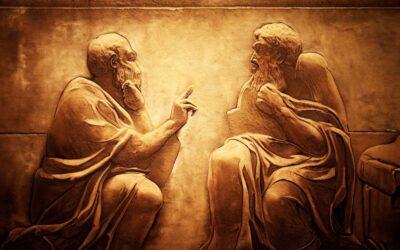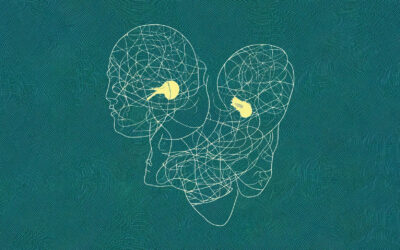Albert Einstein once said: “To know an answer to the question, ‘What is the meaning of human life?’ means to be religious.” And Ludwig Wittgenstein, considered as one of the 20th century’s greatest philosophers, said: “To believe in God means to see that life has a meaning.” Or, was philosopher Bertrand Russell right when he announced that “The universe is just there, and that’s all. No purpose, no meaning, just the brute fact of existence?”
Firstly, what does meaning even mean?
The meaning of a word is the idea people intend to express by it. But when we ask whether life has meaning, we mean more than that. We’re thinking of purpose, intention, and even design. We could say the designer of a car means for their design to be used to transport people, so cars have a meaning to them – they’re not random, accidental collections of metal, glass and plastic.
So what about life?
Secular thinkers are beginning to come to terms with the possibility that life may be meaningless. If the existence of life is accidental, can it possibly have meaning? Can an unintentional by-product of chemistry + physics + chance + who knows what, confer purpose? In response to this bleak reality, many have responded, “Oh well, who cares if life has no meaning, it can have whatever meaning you choose to give it.” So those who think life has no meaning nonetheless continue to live as if life does have meaning in-order to find satisfaction in life.
But hang on, can you see the inconsistency?
No amount of wishful thinking can undo reality; if life is meaningless, then we can’t just invent a meaning to it and then believe in it. Is that really meaningful or just a crutch to help us cope? Doesn’t that demonstrate the very essence of self-delusion – deliberately living in a way contradictory to what you think in order to satisfy your desires? So if you really do believe life is meaningless, then shouldn’t you live accordingly to be consistent? The issue is, that to live like this is not quite that easy, it’s actually unlivable.
But we also have another contradiction to contend with, to say life is objectively meaningless is illogical.
C.S Lewis said, “If the whole universe has no meaning, how would we ever have found out that it has no meaning? Just as, if there were no light in the universe and therefore no creatures with eyes, we would never know it was dark. Dark would be a word without meaning.” So if life is objectively meaningless, then ask yourself, is this a meaningful statement? How can you debunk meaning and value while making a meaningful statement against life itself? Because if what you said is meaningful then everything is not meaningless, on the other hand, if everything is meaningless then what you say is also meaningless so you can basically make no point. If life itself is meaningless, why would yours or any philosophy be meaningful?
It would seem, then, that we are not going to escape the reality of meaning so quickly. The fact is, we can’t actually live without it. Meaning is the substance that guides us, it’s what drives us, what wakes us up in the morning, and what compels us to achieve and aspire. It’s like the blood in our veins. Without meaning, we die. We are dependent on meaning to live. For example, consider the simple habit of eating:
- Why do we eat?
- Because we get hungry
- Why do we get hungry?
- Because our bodies are programmed to ensure our survival
- Why must we survive?
- So we can reproduce and continue the human race
- Why must the human race continue, why does that matter?
- And so on…
There is a constant demand for a reason, a hierarchy. This process of thought can be applied to anything, including morals and human value. For example, use the same process for a moral stance:
- Why is it wrong to murder?
- Because it takes life
- Why does it matter if we take life?
- Because life is valuable
- Why is life valuable – what is the basis for life’s value?
- And so on…
There is a pattern. From the simplest of lifestyles to the most complicated of decisions, we depend on a pyramid of meaning, where the decision on one matter is dependent on the basis of something else. Now unless there is an ultimate cause or foundation of meaning from which all other meaning is derived, then everything is ultimately meaningless.
So, why can’t we create our own meaning? Let’s try rewriting one of the examples above:
- Why is it wrong to murder?
- Because it takes life
- Why does it matter if we take life?
- Because life is valuable
- Why is life valuable – what is the basis for life’s value?
- Because I say so
- Why is your opinion valid?
- Because my life is valuable
- Why is your life valuable? And so on…
Any attempt to create our own meaning is self-referential. It begs the question as it relies on its own foundation to justify itself. It makes as much sense as saying unicorns exist because unicorns say so.
What’s more, even if self-referential meaning is valid, no self-referential justification of meaning can ever establish a magnitude to its claimed meaning. If humans have value, is that value little or great? This approach accepts no external scale against which we can compare our level of value. Do we have more value than a beetle? What if the beetle insists it’s more valuable than you and I? Who are we to contradict it?
Everything that goes on in the natural world can only have meaning or value in reference to something else. Take a $100 note; it’s certainly not valuable in its material and if all the humans were gone, it would have no value. Its value is only based on the value that we collectively place on it. In the same way, there can be no ultimate meaning to reality unless there is an ultimate meaning giver, without referring to anything, without beginning or end. As minds are the only things that we know possess meaning and intention, this ultimate meaning-giver must be an ultimate mind, which we can call God.
Yet what happens if we remove God from the equation? Let’s say we go back to that question, “why is it wrong to murder?” We would go on an infinite loop of ‘yes but why…’ until it all loops back, it is all groundless and therefore not true. If there is no God, it would seem that human life is simply an ‘accident’ of nature, the result of the blind interaction of chance and necessity. There is no transcending context to justify the inherent value of life or the existence of objective morals, we are essentially just purposeless electro-biochemical machines controlled by our mindless genes, blindly programmed to ensure survival. There is no real purpose we exist for, no ultimate destiny we ought to pursue. If you remove a transcendent meaning giver then you remove all meaning, and in the meaningless of life you must also accept the meaningless of all that we live for. Love, human value and ethics cannot be objectively justified in a world where matter alone exists. Many have sought to do away with God but have refused to deal with the legitimate consequences of meaninglessness. The denial of God and the death of meaning cannot be severed from each other. The farther we move from God, the more we devalue man.
Thankfully, though, most of us live as though it matters whether justice is done, whether we survive and whether human rights are upheld. We are living as if there is a meaning to life, and so as if there is an ultimate purpose that is valuable in its own right. This is where our sense of moral conviction comes from. Morality is a ‘why’ question, it requires meaning. We understand moral fairness and insist that our idea of fairness, right and wrong are meaningful. We cherish relationships and insist on equality. We’re living our lives as if moral claims are objectively true, and so as if there is an ultimate meaning to our lives. We do not live as if nihilism is true.
When someone believes in an atheistic worldview devoid of an absolute moral framework while maintaining a belief in a definite moral code, then what they are doing is borrowing. In the west, we have inherited the Judaic ethic of justice and the Christian ethic of love. An atheist who tries to maintain objective moral standards ignores that this is only truly justified if there is a transcendent basis, a God, for it to gain its purpose.
Everyone is religious
If you think life has no meaning but live as if it does, should I be convinced of what you believe by how you think or by how you live? In other words, many may confess to not believing in God, but that doesn’t change the fact that they will still live according to the idea of God – as if there is a purpose and meaning to life. So when one militantly says, “I don’t believe in God, it’s all pointless”, well sorry, it’s just not that simple. The reality of life offers too much evidence.
We don’t face the horror of the 20th century, in which millions were slaughtered, in which Nazi Germany buried thousands alive, castrated children, gassed entire families, and then say there’s no such thing as good or evil – that it’s all just pointless particles reacting in a meaningless universe. If you really believe everything is meaningless, then you have no right to say the Nazis did evil. None of us acts as a nihilist when we look down at our child filled with love or hear their first words “Mum” or “Dad” or the simple words “I love you”. Our words, actions, precious friends and family have more meaning than accidental atoms can account for.
A belief in God means the origin of morality, love and human value is founded upon a transcendent reality. In this view, we have a definite responsibility to express love and follow the truth, and to not live in moral truth is a sin, an offence against the One who purposed us and what He intended for us to be. The hierarchy of meaning and therefore reasonable living is justified.
Christianity challenges the worldview of modern man. According to the Christian view, God exists and life doesn’t end at the grave. Life is objectively meaningful, purposeful and valuable. Therefore, I can live consistently according to what I believe. So when people ask – does it matter whether God exists? Nothing could matter more. I fear that one day the modern man will realise the implications of denying God and this realisation, if lived consistently, will usher in an age of nihilism with the destruction of all meaning and value in life. I think most people still do not consider this consequence – that in killing God, we have inevitably killed ourselves.
The answer introduced himself
So let me finish with a comforting thought on what the meaning of our lives is all about. I’ll start with the Greeks. In general, they believed that the universe had a rational and moral order to it, and this “order of nature” they called the logos. For them, the meaning of life was to contemplate and discern this order in the world, and they defined a well-lived life as one that conformed to the logos. The Gospel writer John deliberately uses the philosophical term Logos and says this about Jesus:
“In the beginning was the Word (logos), and the word was with God, and the Word was God. He was with God in the beginning. Through him, all things were made. Without Him, nothing was made that has been made. In Him was life, and in that life was the light of all mankind… And the word became flesh, and dwelt among us, and we beheld his glory.”
This statement from John fell like a thunderbolt onto the world of the ancient philosophers. Like the Greek philosophers, and unlike many contemporary ones, John affirms that there is a purpose to our lives – something we were made for, that we must recognise, pursue and honour. This is our responsibility. But then the scriptures go on to insist that the meaning of life is not a principle or some other abstract rational structure, but a person, an individual who even walked this earth. It led to a revolution. If Christianity is true, a well-lived life is not found primarily in just philosophical contemplation and intellectual pursuits, which would leave out most people of the world. Rather, it can be found in a person who can be known, in a relationship that is available to anyone, anywhere, from any background.
John implied that Jesus was the answer to life’s meaning. I think he was right. Why must it be Christ? Well, for reasons that are actually quite obvious. Firstly, the extraordinary need and expression of humankind is reinforced again and again. An examination of life’s varied situations brings us back repeatedly to the underlying craving for a relationship of love and integrity. Lee Iacocca’s words in his book ‘Talking Straight’ are very poignant:
“As I start the twilight years of my life, I still try to look back and figure out what it was all about. I’m still not sure what is meant by good fortune and success. I know fame and power are for the birds. But then life suddenly comes into focus. And, ah, there stand my kids. I love them.”
If relationships bring meaning to life, then the ultimate mockery of life is the reality that all relationships are either ruptured by immorality or severed by death. Each of us longs for a relationship that cannot be victimised by sin or destroyed by death. There is only one relationship that is neither victimised by sin nor destroyed by death, and that relationship can only be found with God. Christ bore the weight of our sin. Christ rose from the grave. He beat sin. He beat death. And now he stands with the keys, opening the door to an eternal relationship with God. Once that relationship begins, it serves as a blueprint for all other relationships, bringing the strength of genuine love and shunning the cancer of selfishness.
God has spoken. We were made to have a union with Him. Until He has his rightful place in our lives, neither the squandered immoral life of a harlot, nor the rigorous, self-motivated, ritualistic life of a recluse will discover purpose and meaning. Jesus is the gateway, and so the meaning of life is to accept Christ into your heart. That’s it. While I could spend much time exploring what that really looks like and how that plays out in life, for now, let’s just grasp this fundamental truth about life’s meaning. Jesus is the answer.



